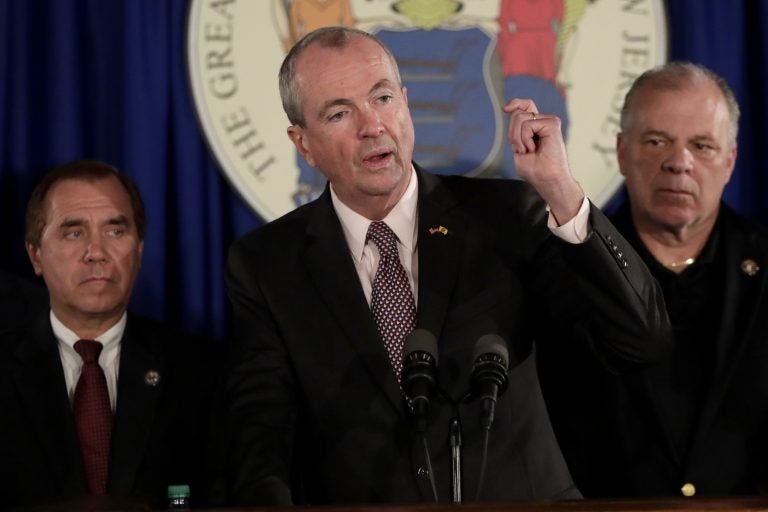Sweeney, Coughlin show governor their power in budget fight
New Jersey Gov. Phil Murphy got funding for nearly all his spending priorities, but he had to give up a millionaires tax, among other concessions to his fellow Democrats.

N.J. Gov. Phil Murphy is pressuring lawmakers to bring the state minimum wage up to $15 an hour. That would fulfill one of his campaign promises. (AP Photo/Julio Cortez)
Gov. Phil Murphy has some of the broadest powers of any governor in the country, but it was the New Jersey Legislature that flexed some muscle in the budget deal that was ultimately worked out over the weekend.
To be sure, Murphy, a first-term Democrat, came away with the funding for nearly all of his top spending priorities in the final version of the fiscal year 2019 budget, which was enacted late last night after a package of related bills was approved in both houses of the Legislature yesterday.
That means there will be new money for K-12 education, mass transit, and public-employee pensions, which Murphy identified during last year’s gubernatorial campaign and featured in his original budget proposal as the main areas where he would seek increased state investment.
But to get that funding boost, the governor had to give up his pitch for a true millionaires tax, deciding instead to accept the establishment of an awkward sounding pentamillionaires tax — a higher state income-tax rate that will be levied on earnings over $5 million. Also gone by the wayside is the restoration of a 7 percent sales-tax rate, which he had called for. In addition, he was forced to accept lawmakers’ call for a higher corporate tax rate, and to allow for a tax-amnesty program that has the potential to create a $200 million hole in next year’s budget.
Meanwhile, Senate President Steve Sweeney (D-Gloucester) and Assembly Speaker Craig Coughlin (D-Middlesex) convinced the governor to rewrite his original school-funding scheme and boost funding for Homestead property tax relief, which were key priorities for Sweeney and Coughlin, respectively. A series of other legislative add-ons that were inserted into the budget are also being fully funded, according to details of the agreement that were disclosed to reporters.
Hard negotiations
After the budget deal was reached following hard negotiations on Saturday — just hours before the deadline for a government shutdown — Murphy, with Sweeney and Coughlin standing by his side, characterized the first spending plan of his tenure as a “strong first step” toward his oft-repeated campaign message of creating a “stronger and fairer” New Jersey.
“We have just started on this journey,” the governor said.
At $37.4 billion, the final version of the budget will spend the exact same amount of money that Murphy called for in March when he put forward his original budget plan. Also making it into the final version is $242 million in additional aid for New Jersey Transit that Murphy included in his original budget, and another combined $400 million in additional K-12 and pre-K education dollars. A total of $25 million in new aid for community college students also made the final cut, which was another top priority for the governor.
WHYY is your source for fact-based, in-depth journalism and information. As a nonprofit organization, we rely on financial support from readers like you. Please give today.




